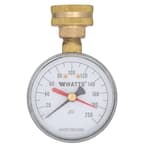Sorry if this gets lengthy, it has been a frustrating ordeal.
We have a sandpoint well, 24' down, last year had 12' of water in pipe. We run a 2 hp motor, for 10 zones, 6-7 heads a zone. This had been working wonderful for years. A few weeks ago one of the zones that has no heads was accidentally turned on for 12 min. This happened while we were sleeping, so we never saw it till we got up. By then pressure had built up and blew our lines off our pump. Water was still pumping out the pump.
We hooked it all back up, we get water to all heads, but not enough pressure to pop them up.
Put in new solenoids, diaphragms, etc. No luck.
Then took the pump off and looked inside, it was cooked, so put the new rebuild kit in it. Pump motor sounds fine. Put the pump back on and we can only get 10 psi coming out of the pump, no leaks we see. Again not enough pressure to pop the heads up. At this point, we had thought the pump was the problem, now we are completely out of ideas. Any thoughts would help.
We are considering checking the water level again, but not sure why that would be the issue when it was working just fine.
Any ideas?? Thanks!!
We have a sandpoint well, 24' down, last year had 12' of water in pipe. We run a 2 hp motor, for 10 zones, 6-7 heads a zone. This had been working wonderful for years. A few weeks ago one of the zones that has no heads was accidentally turned on for 12 min. This happened while we were sleeping, so we never saw it till we got up. By then pressure had built up and blew our lines off our pump. Water was still pumping out the pump.
We hooked it all back up, we get water to all heads, but not enough pressure to pop them up.
Put in new solenoids, diaphragms, etc. No luck.
Then took the pump off and looked inside, it was cooked, so put the new rebuild kit in it. Pump motor sounds fine. Put the pump back on and we can only get 10 psi coming out of the pump, no leaks we see. Again not enough pressure to pop the heads up. At this point, we had thought the pump was the problem, now we are completely out of ideas. Any thoughts would help.
We are considering checking the water level again, but not sure why that would be the issue when it was working just fine.
Any ideas?? Thanks!!

